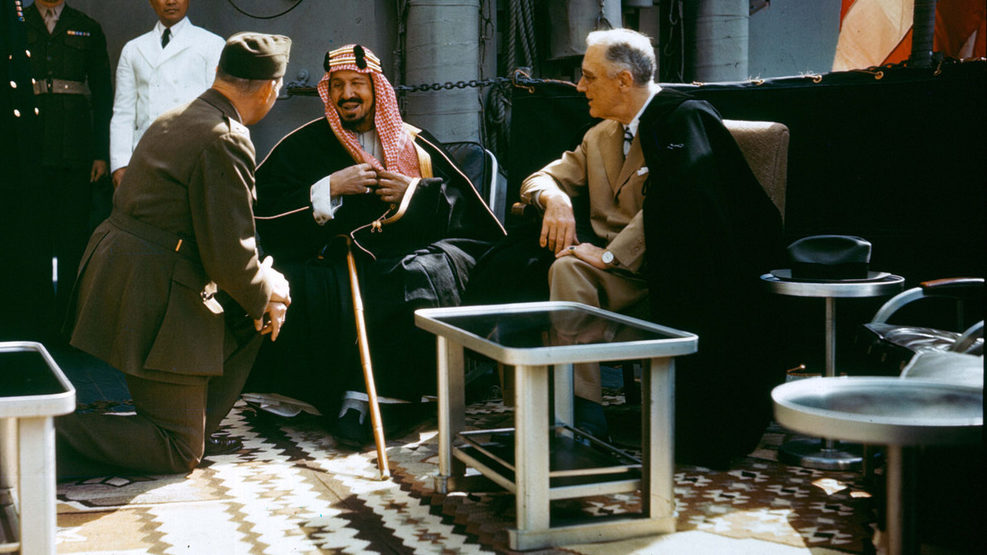Resolute Support for the Palestinian Cause
Okaz, Saudi Arabia, February 5
Upon learning of President Franklin Roosevelt’s 1945 statement outlining the United States government’s position on Palestine, King Abdulaziz, may God have mercy on him, quickly responded.
Through the chargé d’affaires at the American Legation in Cairo, he dispatched an urgent message to President Roosevelt to articulate both his and his country’s stance on this complex issue, fervently advocating for the justice of the Palestinian demands and their right to self-determination.
The message read in part:
“Your Excellency the President. We have seen what was published about the position of the United States government regarding supporting the Jews in Palestine. Given our confidence in your love for truth and justice, and in the adherence of the American people to the basic democratic traditions based on supporting truth and justice and supporting the defeated peoples, and given the friendly relations existing between our kingdom and the United States government, we would like to draw your attention, Your Excellency the President, to the issue of the Arabs in Palestine and their legitimate rights therein.”
This missive emerged as one of the most detailed and profound communications received by President Roosevelt. King Abdulaziz delved into the nuances of the Palestinian issue, supported by historical context and legality, demonstrating his acute understanding of its intricacy.
Saudi Arabia did not cease with merely dispatching this message; for decades, it continued staunchly supporting Palestinian rights, providing them a platform on the global stage.
A striking testament to this commitment was its decision to forgo its United Nations seat in favor of Palestinian representative Ahmad Shukeiri, despite global perceptions at the time framing Palestinian representatives as terrorists.
This holiday season, give to:
Truth and understanding
The Media Line's intrepid correspondents are in Israel, Gaza, Lebanon, Syria and Pakistan providing first-person reporting.
They all said they cover it.
We see it.
We report with just one agenda: the truth.


The Saudi leadership challenged those narratives and awarded him citizenship, enabling him to advocate for his cause directly on the world’s premier stage—the United Nations.
In a bid to avert the collapse of the Palestinian cause, Saudi Arabia swiftly deployed Prince Bandar bin Sultan to Lebanon in 1982, accompanied by American diplomat Philip Habib, aiming to rescue the Palestine Liberation Organization (PLO) from a looming demise amid the Israeli invasion of Lebanon and the PLO’s entrenchment in Beirut after a devastating conflict.
The Saudi initiative facilitated the PLO leadership’s safe exit from Beirut to Tunisia, allowing them to continue their political activities from abroad.
Saudi Arabia’s diplomatic efforts bore fruit when it persuaded the US administration under President Ronald Reagan to acknowledge the PLO as the sole legitimate representative of the Palestinian people in 1988.
Upon being informed of the US decision by Prince Bandar bin Sultan, Yasser Arafat reportedly celebrated, calling the recognition a pivotal development toward resolving his people’s cause.
This recognition marked a substantial shift, transitioning the Palestinian cause from the sphere of terrorism—as previously categorized by the US and Western nations—to legitimate political discourse, culminating in the landmark Oslo Accords of 1993.
President Ronald Reagan’s statement on opening dialogue with the PLO, dated December 14, 1988, declared:
“The Palestine Liberation Organization today issued a statement in which it accepted United Nations Security Council Resolutions 242 and 338, recognized Israel’s right to exist, and renounced terrorism. These have long been our conditions for a substantive dialogue. They have been met. Therefore, I have authorized the State Department to enter into a substantive dialogue with PLO representatives.
“The Palestine Liberation Organization must live up to its statements. In particular, it must demonstrate that its renunciation of terrorism is pervasive and permanent. The initiation of a dialogue between the United States and PLO representatives is an important step in the peace process, more so because it represents the serious evolution of Palestinian thinking toward realistic and pragmatic positions on the key issues.
“But the objective of the United States remains, as always, a comprehensive peace in the Middle East. In that light, we view this development as one more step toward the beginning of direct negotiations between the parties, which alone can lead to such a peace. The United States’ special commitment to Israel’s security and well-being remains unshakable. Indeed, a major reason for our entry into this dialogue is to help Israel achieve the recognition and security it deserves.”
Today, the Kingdom of Saudi Arabia, through its Ministry of Foreign Affairs, reiterates the enduring commitments expressed by Saudi Crown Prince Mohammed bin Salman.
He continues to champion a tangible project for establishing a Palestinian state, underscoring in his addresses before the Shura Council and during his leadership at the joint Arab-Islamic summit a clear and unequivocal stance on the matter that leaves no room for misinterpretation.
These unyielding principles reflect the foundational philosophies established by King Abdulaziz, carried forward by his sons who have ruled after him, building a legacy that endures with King Salman and Crown Prince Mohammed bin Salman, who remain resolute in their continued support for the Palestinian cause.
Mohammed Al-Saeed (translated by Asaf Zilberfarb)

